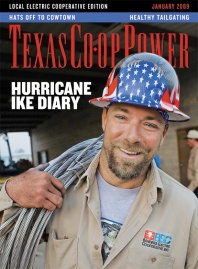Electric linemen are hard-hat hometown heroes who brave ice storms, windstorms and pelting rains to get the power back on when the weather goes bad. And when they aren’t riding to the rescue in a storm, they often brave scorching heat and bone-chilling cold to build and maintain the lines that keep power flowing to homes and businesses.
Electric cooperative linemen’s rapid response to areas hard hit by Hurricane Ike in September showed these brave souls at their best. “Linemen are special people for whom I have tremendous respect,” said Ray Beavers, chairman of Texas Electric Cooperatives (TEC) board of directors. “It takes someone who is not afraid to work, who believes in team effort and is committed to the job—day and night—whenever the call comes.”
The skills of linemen, right-of-way workers and other employees who feel at home in a hard hat are in demand. There is growing concern among power providers in Texas and elsewhere that there may be shortages of experienced linemen in the next few years.
“It is definitely something that co-ops and other utilities need to address,” said Beavers, who also serves as chief executive officer and general manager of United Cooperative Services, a Cleburne-based electric cooperative. The biggest hurdle right now is what Beavers calls the anniversary-date issue—a growing number of linemen nearing retirement. For example, about 10 percent of the linemen at his co-op will be ready for retirement in the next few years, he said.
Fortunately, community colleges are stepping forward to offer one semester of basic training, after which graduates can move to the top of cooperative hiring lists. Kilgore College and South Plains College have programs in place. Three other colleges—Tyler Junior College, The Victoria College and Western Texas College—are developing programs. And the Southeast Lineman Training Center based in Georgia is building a campus in Rockwall County.
“Training is absolutely crucial,” said Tiffin Wortham, TEC vice president, member services. He is in charge of providing additional training once a Texas cooperative hires an aspiring lineman.
Wortham oversees TEC’s Loss Control schools held across the state, usually at co-op facilities. In 2008, there were 35 schools covering transformers, troubleshooting, basic and advanced pole climbing, underground line construction, overhead line construction and metering. Schools were held in Fredericksburg, Merkel, Gonzales, Quitman, Tahoka, San Augustine, Livingston, Levelland, Henderson, McGregor and other locations so applicants and workers working on advanced skills do not have to travel long distances to receive training.
“It takes about five years of training and apprenticeship for a lineman to get to the level of journeyman and able to handle a variety of duties,” Beavers said. “Electric cooperatives have some advantages in attracting qualified people interested in a career as an electric lineman. Besides being stable employers, electric co-ops are family-oriented and employee-oriented, and they offer good pay and benefits.
“For the right person, it is a great career, and clearly it is one that makes a difference in people’s lives,” Beavers said.
Anyone interested in a career as a lineman should contact his or her local electric cooperative or Tami Knipstein in the Member Services Department of TEC at [email protected] or visit the TEC website: www.texas-ec.org.

